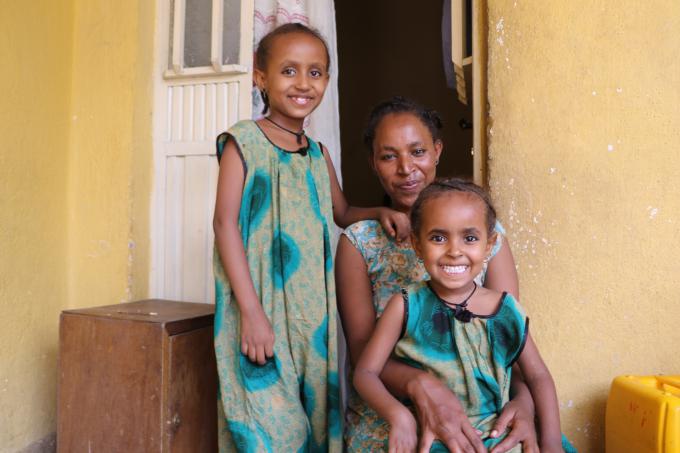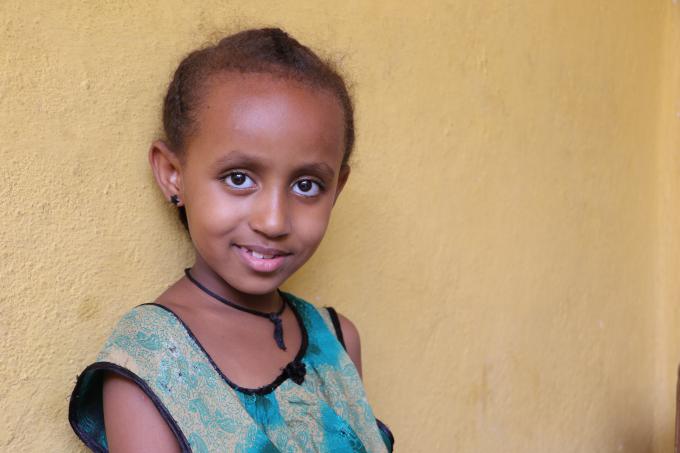Helping families during the COVID-19 Pandemic: Rahel’s story
Eight-year-old Rahel lives with her mother Almaz, her sister Hirut and her father in Dire Dawa. Almaz and her families are among the 6,150 people that identified as the most food insecure households across Dire Dawa City Administration. The family’s livelihood were further affected by the economic restriction put in place to halt the spread of the deadly Coronavirus pandemic. Almaz’s family has now been identified as one of the target beneficiaries for cash support through the Emergency Food Assistance for Households Affected by the COVID-19 Pandemic in Major Cities project implemented by Save the Children. The project is funded by USAID.
Rahel’s story in her own words (quotes):
“My name is Rahel. I am eight years old and first grade student. I live with my younger sister, my mother and father. My older brother and sister lives in Addis Abeba. Corona is a virus that cause illness in humans. People who are sick with it have symptoms like fever, headache and cough.
I heard about Coronavirus when I was at school. Soon after I heard about it, our school was closed. On TV, I heard people say “stay home at all times and when you go out you need to wear a mask and gloves.” I also learned that we should take cautions on things we touch because we might contact the virus; so we should always wash our hands or apply sanitizer.
When I think of the Coronavirus, I am always worried about my mother, my sister and brother in Addis Abeba. I do not want them to be hurt by the Coronavirus. I also want to be careful so I will not get a Coronavirus and whenever I touch dirty things, I always wash my hands.
Before Coronavirus, my mom and my dad used to work and earn good income. Now that has changed. After the virus, my mother has to quit her job and stay home. The salary that my father earns is very small. In the past, my dad used to take me to the recreation centre where I played different games like circle and slide. He bought me ice cream and fruits. However, due to the Coronavirus, we cannot play there and my mom always tells me not to leave the house. Before, we also used to eat diverse foods, like egg, milk and meat. Now, we regularly eat Shiro, (stew made from ground chickpeas flour) which I do not like to eat and I feel sad.
When we were in school, we used to play with our friends and learn. My teachers gave me good care and helped me in my studies. Now with this virus, I cannot go to school and I am not able to learn. Even the learning materials I received from school are unclear and I find them difficult to understand. I sometimes refuse to read my notes.
My message to other children here and around the world is that you should not be worried. This time will pass and schools will soon be reopen. Then we shall share happy moments once again. When I close my eyes, I see God taking this virus away from us. When I grow-up and finish school, I want to be a judge.”
Almaz’s story in her own words (quotes):
“My name is Almaz. I am 27 years old. I have two children and my husband has another two children from his previous marriage. They both live with their relatives in Addis Abeba. My oldest daughter Rahel is eight years old and her youngest sister Hirut is four years old. Before schools were closed, Rahel was in first grade at the nearby school. Hirut will begin school this coming year.
We had a good life before all this happened. I used to work as a hairdresser and earned good income. At that time my children used to eat egg, milk and vegetables at least twice a week, but now they do not get that. They often eat the same kind of food. I want to feed my children nutritious food such as egg, milk and meat but currently due to our poor economic status, I am not able to do so. Usually, I give my children Enjera with Shiro (flat bread made from thin grain flour and stew made from ground chickpeas flour). There were times that my children refused to eat this same thing and stay hungry most of the day.
I feel sad and disappointed that I am unable to provide my children with sufficient and nutritious food. This really makes me sad.
This time, our biggest problems is the lack of food. The price of food has significantly increased. For example, the price of Teff (Ethiopia’s staple food from which Enjera is made), tomato and onion has skyrocketed, making it difficult for us to buy them. Tomato is the most important ingredient needed to prepare our food. However, we no longer afford it. I am worried that if the living expenses continue to rise we may not be able to provide our children with enough food and eventually they could starve.
When I was working at the hair salon a long time ago, I fell ill. I had kidney disease and gastritis too. Therefore, I have this burning sensation when I eat something sour. At the time, I did not get treatment. Now with the support I get from this project, I plan to go to the hospital for treatment and medicine. With the money I receive, I want to provide nutritious food for my children and pay school fees.
It has been almost five months since schools were closed and like many other children here, Rahel spends most of her day at home and playing with her sister. Although the school provides a remote learning, it is not as effective as the classroom-based learning. I saw Rahel struggle to learn to read and write from the notes that she was provided by the school. She has lost interest in her education. I am not sure what the future holds for my children.
It is so frustrating that the disease is getting worse and worse by the day when we think that our children will go out and play. Living expenses are also increasing by the day. My husband’s salary is too small to cover our family expenses and this worries me the most. I am also worried about my children’s education and their future. I understand that it is through education that my children could have a better future.
I am very grateful to those who provided us with this support. May God bless them all. God willing when this pandemic goes away, I want to return to my work and send my children to school. I wish my children reach the highest level of success.”
What Save the Children doing to help Almaz and others like her?
Save the Children, through the Emergency Food Assistance for Households Affected by the COVID-19 Pandemic in Major Cities in Ethiopia project provides cash support to families whose livelihoods impacted by the pandemic for the coming six months. This support will enable households to purchase and provide enough food to their families.
The project is funded by USAID with a total budget of nine million USD for six months. The project aims to increase household access and consumption of diverse nutritious food. The project will implement in six major cities in Ethiopia namely, Addis Abeba, Adama, Dire Dawa, Jigjiga, Hawassa and Bahirdar reaching 29,035 households.
 Ethiopia
Ethiopia 
